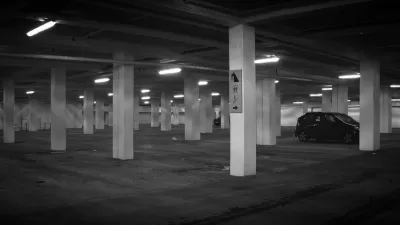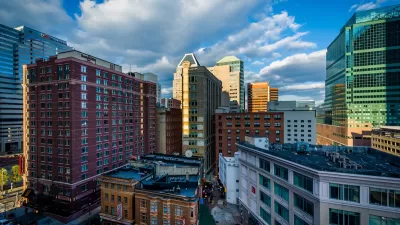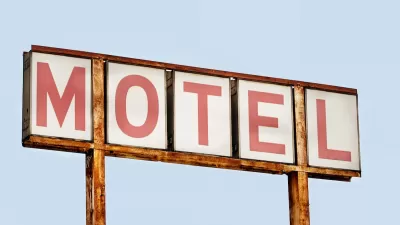As garage operators find their businesses increasingly unsustainable, some are looking to affordable housing as the logical next incarnation of their buildings.

"A rapidly declining demand for parking space in the heart of America’s cities" could be an opportunity to repurpose parking garages into affordable housing, writes Wes Guckert.
Reduced numbers of workers commuting into Central Business Districts combined with "the increased emphasis the Biden administration – and many cities around the country – have placed on climate action and the need to limit automobile use" have led to a "nearly impossible" situation for garage operators, who now find their traditional business model unsustainable.
"Some operators have been fortunate enough to own lots or garages that sit on prime parcels of center-city land. For them, selling their property might represent a viable option, although with demand for office and adjacent retail space declining, this is not as profitable a solution as it was prior to COVID-19." But some operators found creative ways to generate revenue: during the pandemic, "[s]ome garages were transformed into outside dining areas or makeshift drive-in movie theaters, while others were used to house pop-up warehouses, storage units and parking for Amazon delivery fleets."
Another useful conversion: affordable housing. "[E]nterprising operators are now lobbying planning and zoning boards in cities around the country to relax restrictions so that they can retrofit their under-used garages to provide affordable living space for families." Some projects have already become reality. "[T]he success of units such as a derelict 500-car garage in Wichita, Kansas, that was recently converted into 44 one-bedroom apartments demonstrates that such conversions are not only possible, but can play an important role in addressing this country’s longstanding problems with affordable housing and homelessness. "
FULL STORY: Giving new life to deserted parking garages

Alabama: Trump Terminates Settlements for Black Communities Harmed By Raw Sewage
Trump deemed the landmark civil rights agreement “illegal DEI and environmental justice policy.”

Study: Maui’s Plan to Convert Vacation Rentals to Long-Term Housing Could Cause Nearly $1 Billion Economic Loss
The plan would reduce visitor accommodation by 25% resulting in 1,900 jobs lost.

Why Should We Subsidize Public Transportation?
Many public transit agencies face financial stress due to rising costs, declining fare revenue, and declining subsidies. Transit advocates must provide a strong business case for increasing public transit funding.

Paris Bike Boom Leads to Steep Drop in Air Pollution
The French city’s air quality has improved dramatically in the past 20 years, coinciding with a growth in cycling.

Why Housing Costs More to Build in California Than in Texas
Hard costs like labor and materials combined with ‘soft’ costs such as permitting make building in the San Francisco Bay Area almost three times as costly as in Texas cities.

San Diego County Sees a Rise in Urban Coyotes
San Diego County experiences a rise in urban coyotes, as sightings become prevalent throughout its urban neighbourhoods and surrounding areas.
Urban Design for Planners 1: Software Tools
This six-course series explores essential urban design concepts using open source software and equips planners with the tools they need to participate fully in the urban design process.
Planning for Universal Design
Learn the tools for implementing Universal Design in planning regulations.
Smith Gee Studio
Alamo Area Metropolitan Planning Organization
City of Santa Clarita
Institute for Housing and Urban Development Studies (IHS)
City of Grandview
Harvard GSD Executive Education
Toledo-Lucas County Plan Commissions
Salt Lake City
NYU Wagner Graduate School of Public Service





























